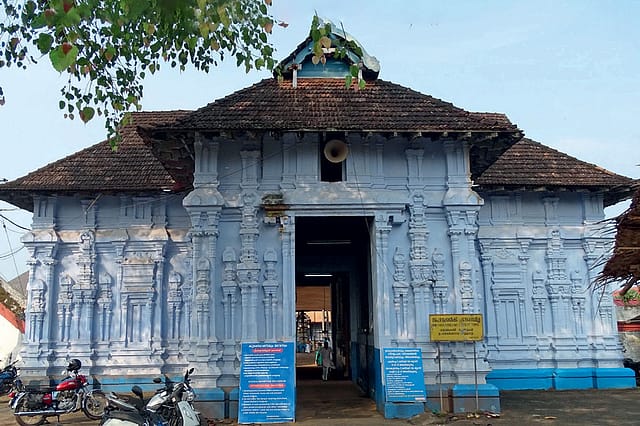Temple Paradox

FOR A STATE that prides itself on being progressive, Kerala has been grappling with a resurgence of caste discrimination, particularly within temple spaces. The Koodalmanikyam Temple in Thrissur has become the centre of controversy after priests (tantris) boycotted all temple ceremonies in protest against the appointment of a so-called avarna individual to a non-priestly role. Their justification? A supposed violation of the temple norms.
The man at the heart of the issue, BA Balu, had previously worked as a kazhakam staff member in temples under the Travancore Devaswom Board. After clearing the Kerala Devaswom Recruitment Board examinations, he was appointed to the Koodalmanikyam Temple to prepare floral garlands for the deity (Bharata) and handle cleaning duties—tasks traditionally performed by kazhakam, meaning assistants to the tantris.
Balu began his duties on February 24, but on March 6 he was informed by the devaswom administrator that he was being temporarily reassigned to office work. Meanwhile, in a statement, the Koodalmanikyam Temple priests have rejected the caste discrimination allegations and maintain that the appointment of Balu violated established norms. Kerala's minister for devaswoms, VN Vasavan, told Open there is no violation of norms in Balu's appointment and the government is committed to retaining him.
A closer examination suggests Balu's appointment may not have violated any ritualistic or lineage-based traditions, argue scholars. Amal C Rajan, who has studied the temple's history, points out that kaaranma (inheritance rights) was not a prerequisite for the role. "For the past 45 years or more, malakettukaar (those who make floral garlands) have not been individuals with kaaranma rights. They were all upper-caste men, but not Brahmins with hereditary claims. The problem arose only after an Ezhava caste person was appointed—and even then, not immediately but only after he had already begun working," says Rajan. He emphasises that if Balu's appointment is considered a violation, then the same violation has been occurring since at least 1971 when the system changed.
Openomics 2026: Continuity and Conviction
06 Feb 2026 - Vol 04 | Issue 57
The performance state at its peak
Nevertheless, Balu was reassigned to office work. The priests argue that family inheritance rights over temple rituals are held by six families, five of whom opposed Balu's appointment in a formal letter to the administrator.
However, Rajan challenges the notion of any family holding exclusive rights over the deity. "Historically, during the peak of Brahmin supremacy, only two manas (Brahmin families)—Tharananalloor and Animangalam—held the right to serve as tantris at Koodalmanikyam Temple. It was only later that four other families were granted the same rights. This flexibility proves no family has a permanent or exclusive claim over the deity." He also dismisses claims that Tharananalloor's representatives supported the Temple Entry Proclamation of 1936, clarifying that official records from the 'Report of the Temple Entry Enquiry Committee' show that they had opposed the entry of avarnas into Hindu temples.
A section of political observers feels that another concerning aspect of this controversy is the state government's apparent reluctance to take a decisive stand, seemingly to avoid antagonising the priestly class and associated vote banks.
Lekshmy Rajeev, author of Attukal Amma: The Goddess of Millions, highlights a broader pattern of both exclusion and appropriation. She tells Open that caste-based discrimination is not only about keeping lower castes out of temple duties but also about upper-caste dominance over historically non-Brahmin places of worship. "In my book, I detail how the Attukal temple, originally a mudippura (a preserve of the farmers) worshipped by OBCs and Dalits, was later taken over by upper castes. This process of Brahminisation has occurred in other temples as well."
Scholars like TS Syam Kumar and others highlight that temple tantra texts such as Kuzhikkattu Pacha and Prayogamanjari do not mention claims over the deity by tantris. However, the rigid system persists, undermining Kerala's reputation.
